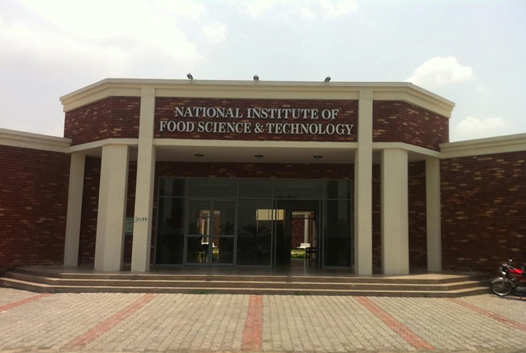The National Institute of Food Science & Technology (NIFSAT) originated as the Food Technology Section within the Punjab Agricultural College and Research Institute, evolving into a department in 1962. Recognizing the significance of the food sector in Pakistan, the department was upgraded to the Institute of Food Science and Technology in 2003, subsequently becoming the National Institute of Food Science & Technology in 2007. Currently, NIFSAT leads in offering degree programs in Food Science and Technology, Human Nutrition and Dietetics, Food Safety and Quality Management, Food Service Management, and Dairy Science and Technology.
NIFSAT consists of six sections and a center, including Nutrition & Food Safety, Grain Science & Technology, Dairy & Meat Technology, Fruits & Vegetables Technology, Oil & Sugar Technology, Food Microbiology & Biotechnology, and the Food Technology Transfer Centre (FTTC). Moreover, NIFSAT maintains robust collaborations with public and private sector institutions at national and international levels. Since its inception, the Institute has been instrumental in producing skilled professionals for the food sector. In 2014, NIFSAT emerged into a 7th faculty in the University namely Faculty of Food, Nutrition & Home Sciences. Prof. Dr. Masood Sadiq Butt was appointed as the founding Dean of the Faculty.
Mr. Clyde W. Eddy served as the first Head of Department. Subsequently, Mr. Muhammad Bakhsh Bhatti, Dr. Sultan Ahmed Tremazi, Dr. Abdul Latif Rasoolpuri, Mr. Riaz-ur-Rehman, Dr. Muhammad Shafiq Chaudhry, Dr. Haji Muhammad Chaudhry, Dr. Ali Asghar, Syed Aulad Hussain Shah, Dr. Amjad Ali, Dr. Javaid Aziz Awan, Dr. Faqir Muhammad Anjum, Dr. Nuzhat Huma, and Dr. Tahir Zahoor have all held positions as Heads/Chairmen/Director/Director General of the Department of Food Technology during different periods. Currently, Prof. Dr. Imran Pasha is serving as Director General of NIFSAT- UAF.

NIFSAT
Strengths of NIFSAT
- Establishment of Pak-Korea Nutrition Centre at University of Agriculture, Faisalabad Focusing on Community and Child Nutrition
- FFNHS degrees hold HEC recognition with W category accreditation
- Developed Punjab Food Fortification Strategy-2018
- Reviewed Nutrition & Food Safety Curricula Practiced at Higher Educational Institutes of Pakistan sponsored by Global Alliance for Improved Nutrition (GAIN)
- Developed Manuals for School Teachers and Students regarding Nutrition Awareness in collaboration with GAIN
- Developed Iron Fortification Technology for Flour Mills and Chakkies in 2002 with the support of Planning Commission of Pakistan
- Developed Prisoners Menu for Punjab Prisons currently in practice
- Effective Role in the Establishment of Punjab Food Authority, DG NIFSAT is permanent Board Member as per Act of PFA
- Developed Local Flour for Pizza Hut and Dunkin Donuts
- UAF is a Member of SUNAR, Scaling up nutrition (Academia & Research) network
- UAF participated in Devising Food Composition Table
- Participated in Devising National Dietary Guidelines
- Developed QA/QC Manual for easier understanding of the millers and in line with global best practices by taking into account Pakistan’s specific requirement
- Revision of Punjab Food Regulations (PFR)-2017, UAF played significant role
- Situation Analysis of large-scale wheat flour, edible oil & ghee fortification funded by Nutrition International (NI)
- Quality Assurance/Quality Control Situation of Flour Mills in Punjab Province with Special Reference to Wheat Flour Fortification in collaboration with Global Alliance for Improved Nutrition in 2015
- Fortification Technology and Product Development
- Established Organic Agriculture Cell at UAF
- Food Research and Development Project at UAF
- 5 Self-Sustained Outreach Centres
Vision
To gain recognition as a top-tier Science & Technology institution, pivotal in revolutionizing the food industry to compete effectively on both national and global fronts, with a special focus on enhancing food security, safety, quality, and nutrition. Our aim is to cultivate skilled professionals capable of excelling in knowledge dissemination and practical application, thereby addressing the evolving challenges of the modern era.
Mission Statement
To provide high-quality education at the undergraduate and graduate levels, leading the way in creating innovative approaches to tackle the pressing issues of food security, safety, and human nutrition, both nationally and internationally.
|
